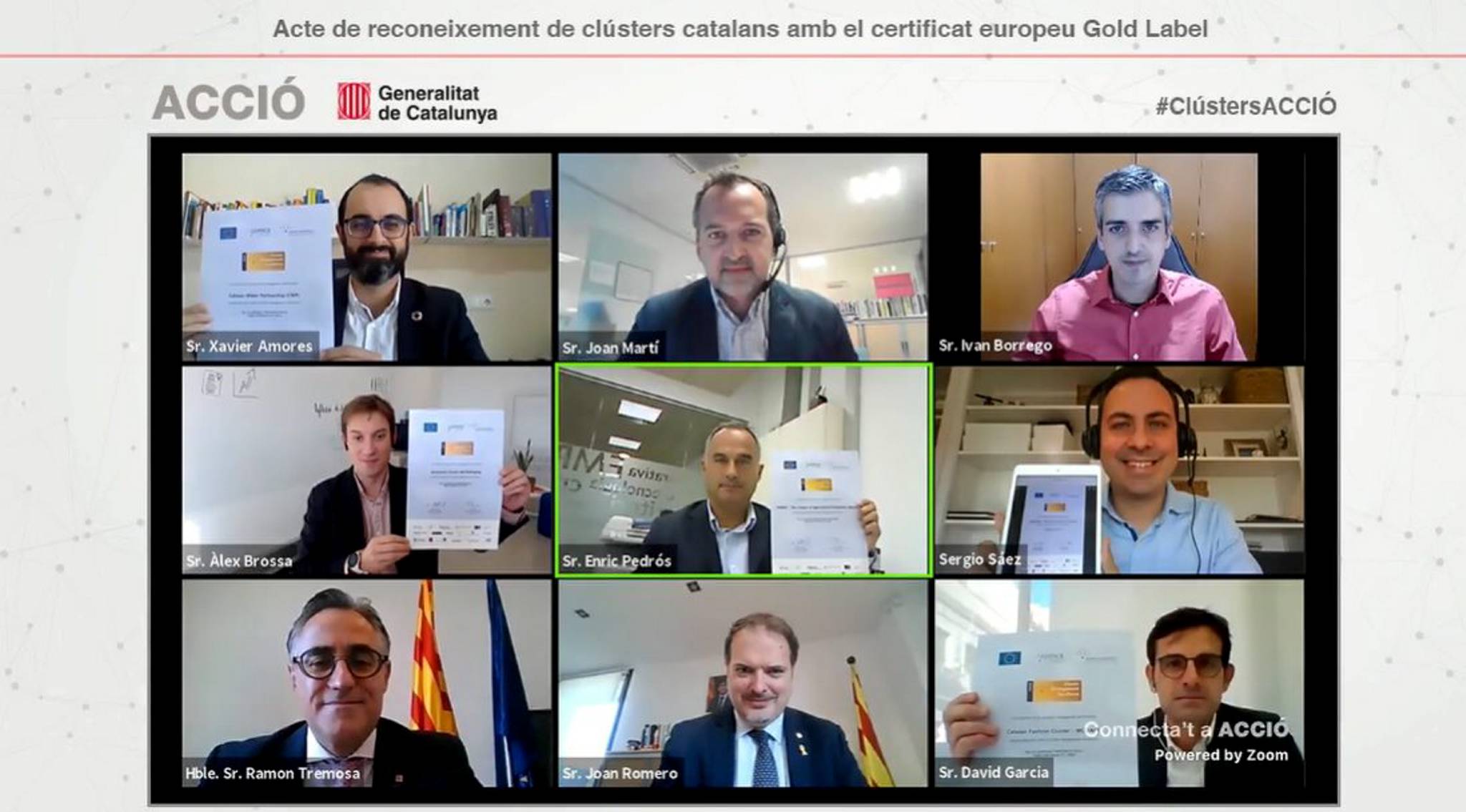- The Catalan clusters Packaging Cluster, MODACC, Catalan Water Partnership, Beauty Cluster Barcelona and secpho have received the Gold Label certificate from the European Secretariat for Cluster Analysis
- The certificate, accessed thanks to the support of ACCIÓ, is one of the most prestigious global awards in the field of clusters, which analyzes indicators such as funding, strategy or qualification of the team that manages the organizations

- According to the Minister of Business and Knowledge Ramon Tremosa, "for Catalonia to have distinguished clusters is very important, because, when the pandemic is over, the opportunities will return very quickly, and it is important to be well prepared and positioned"
The Catalan clusters Packaging Cluster, MODACC, Catalan Water Partnership, Beauty Cluster Barcelona and secpho have received the Gold Label certificate from the European Secretariat for Cluster Analysis (ESCA). This is one of the most prestigious awards in the world in the field of clusters, which certifies the excellence in the management of these organizations. The Catalan cluster FEMAC received already in 2012 thanks to the support of ACCIÓ, the public agency for the competitiveness of Catalan enterprise, attached to the Ministry of Enterprise and Knowledge.
Therefore, 10% of the European clusters with the Gold Label certificate are Catalan. In fact, when it comes to the number of clusters with this accreditation, Germany, Denmark and Norway are ahead of Catalonia. The Minister of Business and Knowledge Ramon Tremosa assured this Friday morning during the recognition ceremony for these organizations that these "excellent figures give us self-esteem as a country ".
During his speech, Tremosa stressed that " for Catalonia to have distinguished clusters is very important, because, when the pandemic is over, the opportunities will return very quickly, and it is important to be well prepared and positioned ". The Minister of Business and Knowledge emphasized in reference to the role of the clusters that “Catalonia has made a very big leap in 10 years, almost tripling the number of foreign multinationals: the Catalan economy has opened up and has internationalized these multinationals , which enables the SMEs to collaborate with big companies and take a leap to all the levels”.
The Director of ESCA, Helmut Kergel, also took part in the recognition ceremony; the CEO of ACCIÓ, Joan Romero; the FEMAC Cluster Manager, Enric Pedrós; the Cluster Manager of Beauty Cluster Barcelona, Ivan Borrego; the CWP Cluster Manager, Xavier Amores; the MODACC Cluster Manager, David Garcia, the Packaging Cluster Manager, Àlex Brossa, and the secpho Cluster Manager, Sergio Sáez.
Receiving Gold Label accreditation requires the analysis of 30 indicators regarding financing, governance, strategy, composition (whether the organization has a presence of multinationals, SMEs, start-ups, universities or technology centres) or rating of the team that manages the organisation. Having this certificate, enables clusters to increase their visibility and international positioning, and provides access to new meeting points with other leading European clusters to carry out projects together and improvement processes.
The Gold Label accreditation is given by the European Secretariat for Cluster Analysis (ESCA), a Berlin-based association that brings together more than 200 cluster experts, manages certification processes and was born out of the European Cluster Excellence Initiative (ECEI), an initiative promoted in 2009 by the European Commission .
What is a cluster?
A cluster is a grouping of companies (start-ups, SMEs and multinationals) and environmental stakeholders (universities and technology centres) in an economic field that share resources, generate synergies and are projected internationally. It is an instrument that enables to improve the competitiveness of the members that take part of it from the development of transformative projects and the definition of strategic challenges for the sector. In Catalonia, clusters represent 30% of GDP (74 billion euros of aggregate turnover) and generate more than 300,000 jobs. It includes 2,600 partners who represent a diverse network of actors: 70% are SMEs, 13% are large companies, 10% are research centres, universities and knowledge providers; and 4.5% are start-ups, among other stakeholders.
- According to the Minister of Business and Knowledge Ramon Tremosa, "for Catalonia to have distinguished clusters is very important, because, when the pandemic is over, the opportunities will return very quickly, and it is important to be well prepared and positioned"
Currently, 29 clusters are part of the Catalunya Clústers of ACCIÓ program, an initiative aimed at helping them focus their strategy, traincluster managers, co-finance strategic projects and organize trips to reference ecosystems to make international benchmarking and close collaboration projects between Catalan clusters or with international entities, among others. Of these 29 clusters, 6 already have the Gold Label certificate.